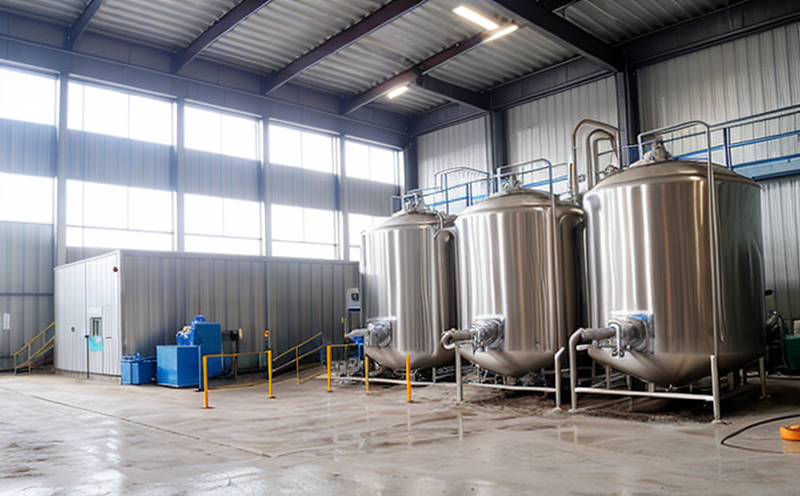ASTM D1079 Acidity Test in Process Water
The ASTM D1079 standard method is widely used to determine the acidity of process water. This test is critical for industries that rely on high-quality water, such as chemical processing, power generation, and electronics manufacturing. The primary purpose of this test is to measure the free CO2 content in aqueous solutions by titration with a strong base like sodium hydroxide (NaOH). The acidity level can significantly impact process efficiency, product quality, and compliance with environmental regulations.
The ASTM D1079 method involves several key steps. First, the sample is prepared according to the specified procedures in the standard. This may include filtering or diluting the sample if it contains particulates that could interfere with the titration. The filtered water is then placed into a suitable container and titrated with sodium hydroxide until the pH reaches 8.2. The volume of NaOH required to reach this point is recorded, which allows for the calculation of the free CO2 content in milligrams per liter (mg/L).
The accuracy of the ASTM D1079 test depends on several factors. Proper sample preparation and handling are crucial to avoid contamination or loss of volatile components that could affect the results. The titration should be performed slowly, allowing for accurate measurement of the volume of NaOH used. Calibration of the titration equipment is also important to ensure consistent results.
The ASTM D1079 test is particularly useful in industries where water quality can directly influence product performance or environmental impact. For example, in the chemical industry, the acidity level of process water affects the efficiency of chemical reactions and the stability of intermediate products. In power generation plants, water with high acidity can corrode equipment and reduce the lifespan of critical components. Similarly, in electronics manufacturing, pure water is essential for preventing contamination during production processes.
The ASTM D1079 test is not only limited to process water but also has broader applications in industries dealing with aqueous solutions that have free CO2. It can be used to monitor the quality of cooling water in power plants, boiler feedwater in steam generation facilities, and rinse water in semiconductor manufacturing. By ensuring consistent acidity levels, these industries can maintain high-quality products, comply with environmental regulations, and reduce operational costs.
The ASTM D1079 test is recognized for its reliability and precision. It has been adopted by numerous international standards organizations, including ISO (International Organization for Standardization) and ASTM International. The standard specifies clear procedures and guidelines to ensure that the results are reproducible and comparable across different laboratories.
- Chemical processing
- Power generation
- Electronics manufacturing
- Semiconductor production
- Cooling water management in power plants
- Boiler feedwater quality control in steam generation facilities
- Rinse water purity assurance in electronics manufacturing
The ASTM D1079 test is an essential tool for maintaining the quality of process water, ensuring compliance with industry standards and environmental regulations. By accurately measuring acidity levels, industries can optimize their processes, enhance product quality, and protect the environment.
Benefits
The ASTM D1079 test offers numerous benefits to various sectors that rely on high-quality process water. Quality managers and compliance officers benefit from accurate data for process optimization and regulatory adherence. R&D engineers can use the results to refine their processes, ensuring consistent product quality. Procurement teams gain confidence in selecting suppliers who meet stringent water quality requirements.
By adhering to ASTM D1079 standards, industries demonstrate a commitment to maintaining high-quality standards. This not only enhances reputation but also fosters trust with customers and regulatory bodies. The test results can be used to identify areas for improvement, ensuring that the process remains efficient and effective over time.
The precision of the ASTM D1079 test ensures consistency in water quality across different batches or production runs. This is particularly important in industries where batch-to-batch variability could impact product performance. The ability to standardize processes through consistent water quality also reduces the risk of unexpected downtime due to equipment failures.
Compliance with ASTM D1079 standards helps organizations meet environmental and safety regulations, reducing the likelihood of fines or legal issues. By demonstrating a commitment to sustainable practices, industries can enhance their reputation and attract environmentally conscious customers.
Industry Applications
- Chemical Processing: Ensuring consistent acidity levels in reaction phases enhances yield and product quality.
- Petrochemicals: Monitoring water quality prevents scaling and corrosion within piping systems, reducing maintenance costs.
- Pharmaceutical Manufacturing: High-purity water is essential for ensuring the safety and efficacy of medications.
- Power Generation: Managing boiler feedwater acidity helps prevent boiler tube failures and extends equipment life.
- Semiconductor Fabrication: Pure water is critical in preventing contamination during delicate fabrication processes.
- Electronics Manufacturing: Maintaining consistent rinse water quality ensures product integrity and reliability.
- Water Treatment Plants: Monitoring incoming process water helps optimize treatment processes, ensuring compliance with discharge limits.
The ASTM D1079 test plays a crucial role in these industries by providing accurate measurements of acidity. This data is essential for maintaining high-quality products and services while adhering to environmental standards.
International Acceptance and Recognition
The ASTM D1079 standard has gained widespread acceptance across the globe, particularly in sectors that require precise control over process water quality. The test is recognized by numerous international standards organizations, including ISO (International Organization for Standardization) and ASTM International.
ISO 8469-2:2015, which references ASTM D1079, specifies the procedures for determining free CO2 in aqueous solutions. This international standard ensures that the test results are consistent and comparable across different laboratories. Similarly, ASTM International's official publication of ASTM D1079 further emphasizes its reliability and widespread use.
The recognition of ASTM D1079 by these organizations underscores its importance in maintaining high-quality standards for process water. Industries around the world rely on this standard to ensure consistent product quality and compliance with environmental regulations.





